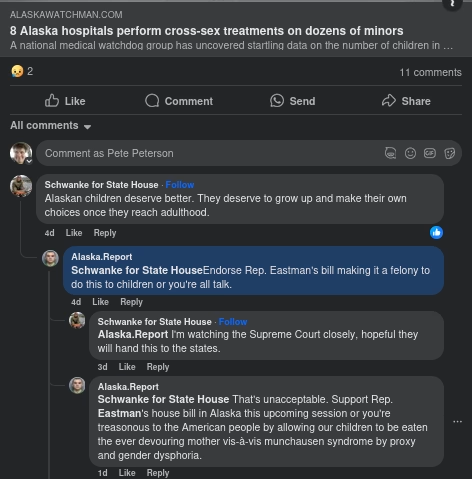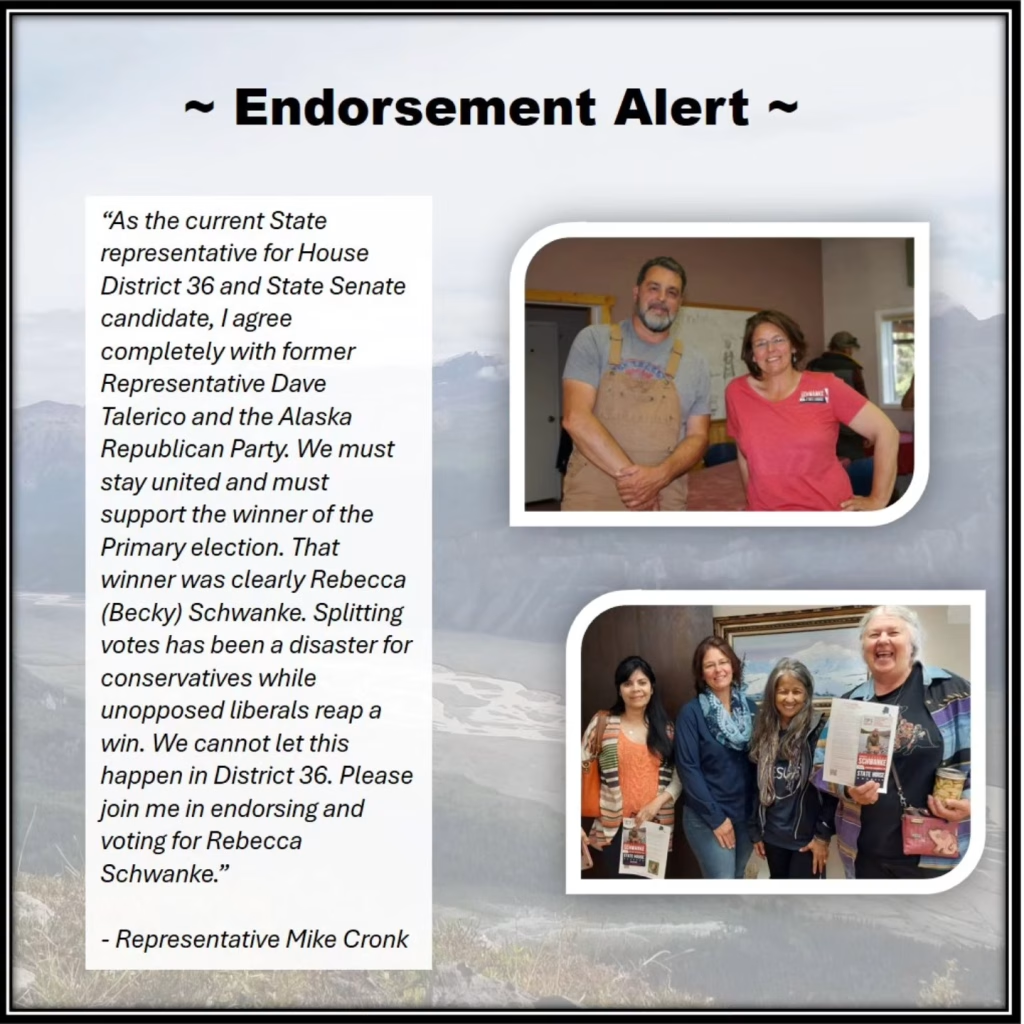Rebecca Schwanke is making headlines, but not for the reasons you’d expect from a conservative candidate. Schwanke, who’s running for Alaska State House, recently commented on a report uncovering shocking data: eight Alaskan hospitals have distributed cross-sex hormones and puberty blockers to minors. Yet, Schwanke’s response—”Alaskan children deserve better” and a promise to “watch the Supreme Court closely”—falls far short of the strong stand needed. At a time when Alaska’s children are at risk, Schwanke’s non-committal statements reveal a candidate hesitant to take meaningful action on one of the most pressing issues facing Alaska’s families.
Alaska’s Medical Industry and the Push for Cross-Sex Treatments
To understand the weight of Schwanke’s lackluster stance, it’s essential to grasp the full scope of the recent report from Stop the Harm. Between 2019 and 2023, nearly 14,000 minors across the country underwent gender-transition treatments, including more than 5,000 surgeries that permanently altered their bodies. In Alaska alone, 293 prescriptions for cross-sex hormones and puberty blockers were issued to 37 minors, with a total of $30,000 in submitted charges. While Alaska hasn’t reported surgeries on minors, the use of powerful hormonal drugs can still have irreversible effects—think heart problems, halted brain development, and permanent infertility.
Alaska’s policies were set back in 2021 when the state decided to allow public funds to cover these treatments after a federal court case. The conservative values of safeguarding taxpayer money and prioritizing parental rights are at odds with these costly and life-altering treatments for minors, yet Alaska continues to funnel money into them without restrictions.
Schwanke’s Response: A Slap in the Face to Conservative Values
When presented with a clear opportunity to support Alaska’s children and families, Schwanke faltered. Her vague comments might suggest that she’s concerned, but when you dig deeper, it’s clear she’s dodging the real issue. Instead of outright supporting Rep. David Eastman’s proposed bill to make cross-sex interventions on minors a felony, Schwanke leans on hollow, bureaucratic language, seemingly waiting on the Supreme Court to do the heavy lifting. This isn’t leadership—it’s a political strategy aimed at avoiding controversy.
Advertisement: They thought they could silence Rep. David Eastman with a lawsuit. They were wrong. Despite winning the trial, David faces a colossal $250,000 burden. This isn't just an attack on him – it's an attack on our values. Due to absurd limits on donations, every dollar up to $249.99 becomes a crucial weapon in this fight for justice. Your support is more than money; it's a rallying cry for freedom. For less than a cup of coffee a day, you can help David continue our fight. Join the cause.
For a candidate claiming to represent conservative values, Schwanke’s position is, quite frankly, baffling. Conservatives have long believed in protecting children from undue influence and championing parental rights. We believe that parents should have the final say on medical decisions impacting their children, especially when those treatments may alter a child’s life forever. By refusing to throw her weight behind Rep. Eastman’s bill, Schwanke essentially waves off the concerns of conservative Alaskans and embraces the status quo.
The High Cost of Inaction: What Alaska Stands to Lose
Schwanke’s failure to take a stand is a serious threat to Alaska’s children and taxpayers alike. The financial cost of these procedures is staggering—$120 million has been billed nationally in just four years. Pharmaceutical companies and hospitals profit immensely from gender-transition treatments, raising questions about whether this push is driven more by economic incentives than legitimate medical necessity. Alaska’s families shouldn’t have to worry about whether their tax dollars are being funneled into an industry that exploits minors under the guise of “gender-affirming care.”

But the real cost here is far more personal. These treatments often lead to lifelong health complications, infertility, and mental health issues. By playing it safe, Schwanke risks exposing a generation of Alaskan children to irreparable harm. A real conservative representative would recognize this and take a hard stance against it, but Schwanke’s comments indicate a worrying willingness to sacrifice children’s well-being for political gain.
Alaskan Voices: The Demand for Accountability
Alaskans aren’t staying quiet about Schwanke’s response. Many conservatives have taken to social media to demand that she support Eastman’s bill or step aside for someone who will. Pete Peterson, a vocal critic, put it plainly: “Rep. Eastman is the only one doing anything about this in the House.” Others, like “MeMe,” shared disturbing accounts of hospital staff pushing gender-related questions on their loved ones in vulnerable moments, highlighting the broader issues within Alaska’s medical system.
The frustration is palpable, and Schwanke’s vague promises aren’t helping. Alaskans want real action, not another politician dodging tough questions. Schwanke has a clear choice: support the legislation that aligns with conservative values and parental rights or continue to hedge her bets, risking the trust of her voters.
Comparison to Other States: Alaska Falling Behind
It’s not just conservative Alaskans who feel let down. Other states like Tennessee, Texas, and Florida have already passed bills to ban cross-sex treatments for minors, setting a strong precedent. By not supporting similar measures, Schwanke is leaving Alaska behind in the fight to protect children. She’s essentially choosing to let progressive agendas dictate Alaska’s policies, which undermines the very principles she claims to represent.
Rep. David Eastman’s House Bill 213 is Protecting Rights of Alaska’s Minors from Genocidal Sterilization Agenda
In a move to safeguard the rights and well-being of minors, Representative David Eastman (R-Wasilla) has introduced House Bill 213, which aims to ban surgeries or treatments that result in the permanent loss of a person’s ability to procreate. This bill, if passed, would establish the crime of “sterilization of a minor” as a class A felony in Alaska. While the bill does not explicitly mention transgender surgeries and cross-sex hormones, it addresses the concern that some of these procedures can lead to permanent sterilization.
The proposed legislation recognizes that individuals under the age of 18 are not capable of giving informed consent to procedures that may permanently affect their ability to have children. This aligns with the belief that minors should be protected from irreversible decisions that may have long-term consequences. By prohibiting sterilization procedures on minors, the bill seeks to prioritize their health, well-being, and future reproductive choices.
It is important to note that the bill allows for exceptions when sterilization is necessary to preserve the life or prevent serious impairment of the physical health of the minor, or if the minor is already infertile. This ensures that medical professionals can still act in the best interest of the minor’s health when necessary.
House Bill No. 213 is A Bold Step Toward Protecting Minors
The bill addresses a critical issue: the consent and sterilization of minors. It stipulates that individuals under 18 cannot consent to procedures resulting in permanent loss of reproductive capabilities. Furthermore, it allows those sterilized as minors to take legal action, regardless of previous consent. This bill is a clarion call to preserve the sanctity of choice and future possibilities for our youth.
The introduction of this bill comes amid concerns about the use of public funds to pay for these procedures in Alaska. The state’s policy of using taxpayer money to fund transgender interventions has raised questions about the ethical implications and potential risks associated with these medical interventions. While the bill does not directly address the use of public funds, it raises awareness about the need for a thorough examination of the state’s policies in this regard.
The implications of this bill extend beyond the medical industry. It prompts us to consider the broader issue of protecting the rights and well-being of minors in our society. It challenges us to have thoughtful discussions about the capacity of minors to make life-altering decisions and the role of parental consent in such cases. It also calls into question the responsibility of the state in ensuring that public funds are used in alignment with public values.
FAQs: Understanding the Issue and How You Can Help
Q: What is the purpose of House Bill 213?
A: The bill seeks to prohibit surgeries or treatments that result in the
permanent loss of a person’s ability to procreate for minors under the
age of 18. It protects minors from irreversible decisions affecting
their future reproductive choices.
Q: Why is Rebecca Schwanke’s stance on this issue concerning?
A: Schwanke’s reluctance to support the bill indicates that she may not have the conviction to take strong, decisive actions on issues crucial to conservatives. It raises doubts about her commitment to protecting children and standing up to progressive agendas in Alaska.
Q: What can I do to support efforts to protect Alaska’s children?
A: You can reach out to Schwanke’s office to express your concerns and demand clarity on her stance. Additionally, consider supporting Rep. Eastman’s bill by contacting your representatives and voicing your support for legislation that protects minors from irreversible treatments.
Q: What does HB 213 entail?
A: HB 213 prohibits minors from consenting to sterilization and allows legal action by those sterilized as minors.
Q: Could this influence laws in other states?
A: Yes, Alaska is a conseratrive beakon. it could set a national precedent for the protection of minors
Q: What exceptions are allowed under the bill?
A: The bill allows for exceptions when sterilization is necessary to preserve the life or prevent serious impairment of the physical health of the minor, or if the minor is already infertile.
The Final Call: Schwanke, It’s Time to Lead or Leave
Alaska doesn’t need politicians who play both sides of the fence. Alaskans deserve leaders who act, especially when it comes to safeguarding children. If Schwanke can’t stand up for these kids, she should reconsider her run for office. Voters need more than vague promises and empty reassurances. As Proverbs 31:8-9 reminds us, “Speak up for those who cannot speak for themselves; ensure justice for those being crushed.” Alaskans must demand action, accountability, and a candidate who won’t shy away from fighting for conservative principles.

of the House Health & Social Services Committee
As this bill progresses through the legislative process, it is crucial for Alaskans to stay informed and engaged. Contacting the members of the House Health & Social Services Committee, co-chaired by Republican Representatives Mike Prax and Justin Ruffridge, can be a valuable way to voice concerns and provide input on this important matter.
House Bill 213 serves as a reminder of our duty to protect the rights and future of Alaska’s minors. It prompts us to have critical conversations about the ethical implications surrounding medical interventions on minors and the responsible use of public funds. Let us remain vigilant and involved in shaping policies that prioritize the well-being of our future generations.
